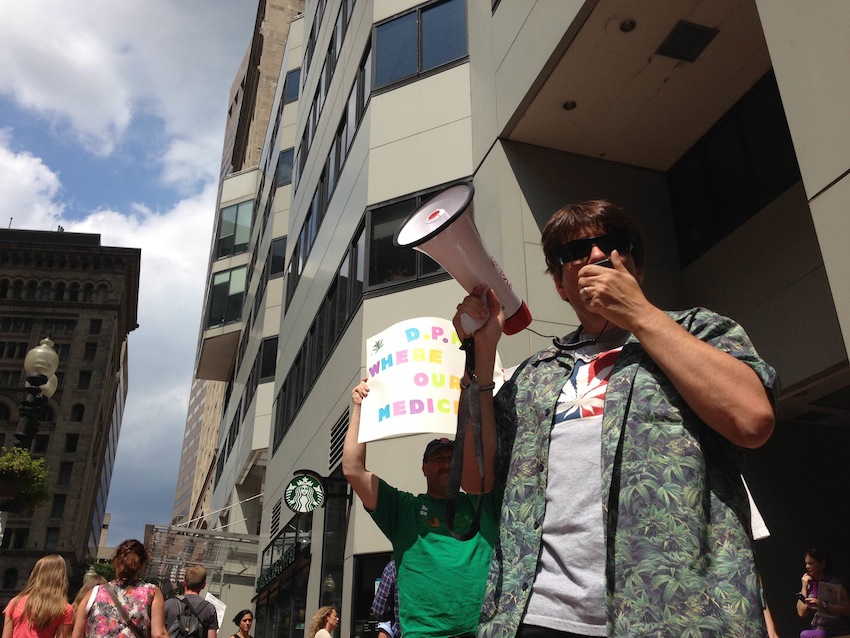Pot Proponents Protest Department’s Oversight of Medical Marijuana Industry
Marijuana advocates are outraged with the state’s decision to cap the number of people a distributor can sell the plant to when acting as a caregiver.
On Thursday afternoon, more than a dozen protesters stood outside of the state’s Department of Public Health building on Washington Street in Downtown Boston, and shouted loudly through megaphones, expressing concern over specific wording in the medical marijuana law, claiming it will debilitate patients that rely on the use of the drug to help curb pain and other illnesses.
The Department of Public Health, who was tasked with writing the rules and regulations for the use and distribution of marijuana in Massachusetts, decided that each “caregiver,” or person who grows the drug for patients to use, can only serve one patient at a time. According to the language devised by department officials:
A family member or friend who is at least twenty-one 21-years-old may care for a patient using marijuana for medical purposes. DPH’s final regulation requires that except in the case of certain health care workers providing care to a qualifying patient, or immediate family members, a caregiver may only serve one patient. A qualifying patient may have up to two caregivers.
Mike Cann, one of the organizers of Thursday’s protest, said with that regulation in place it will leave people who truly rely on marijuana without their medicine. Cann compared it to allowing only one Stop and Shop, or other pharmacy, to be open in a certain part of the state. “Imagine if they had a pharmacy in one spot—that’s not going to happen, because it’s not right. And imagine if they limited the type of medicine that they gave to people at that pharmacy? That wouldn’t fly, would it?,” he said.
Protesters said the stipulations in the medical marijuana law go against everything that voters were in favor of when a ballot question was passed in November of 2012 to allow the drug to be available to patients.
In May, Massachusetts officials cleared the smoke on the medical marijuana rules just six months after voters approved of the ballot initiative. Besides the rules about caregivers, the final recommendations include allowing a qualifying patient to have up to 10 ounces of marijuana for a personal 60-day supply, and require changing the name of medical marijuana treatment centers to “registered marijuana dispensaries.”
The rally on the steps of the facility came one day before the department began accepting applications from potential pot growers interested in opening up weed dispensaries and businesses around the Commonwealth.
Applications will be reviewed in two phases, and the initial forms must be completed by August 22. Applicants who meet the qualifications in Phase 1 will be eligible to proceed to Phase 2 this fall where a selection committee will conduct an in-depth review and select dispensaries through a competitive process. Prospective marijuana dispensaries will be required to pay a $1,500 fee for submission and consideration of the Phase 1 application, and $30,000 if they qualify for Phase 2, both of which are non-refundable, according to a statement from DPH officials.
Cann, who is a patient himself, said he could get better quality marijuana from the streets than he could from a dispensary, but cited the legal ramifications that could have since the restrictive language in the department’s regulations would prevent the sale from a person that was limited to being a caregiver to a single buyer.
He said once dispensaries open, it will also limit who will have access to medical marijuana because the stores will likely put a high price tag on the drug. “Because this is Taxachusetts,” he said. “People will probably have to try and grow it themselves, which will be difficult, because there are more patients than there are caregivers.”
The DPH said in May that they “carefully considered hundreds of opinions and concerns from across the Commonwealth to create a medical marijuana system that is right for Massachusetts,” but Cann and the other protesters said they didn’t listen to patients about the need to allow caregivers to serve at least five customers each. “They basically rewrote the entire law, after it was passed by the voters,” said Michael L. Malta, the self-proclaimed “King of Pot,” and long-time medical marijuana activist. “They are doing this because they want to monetize from bigger businesses coming from out of state who are interested in applying for licenses to open up shops in Massachusetts.”
Malta said prohibition of the law needs to end, and the state needs to “stop screwing” with it. “We have the right to grow. Marijuana has never killed anybody,” he said.


